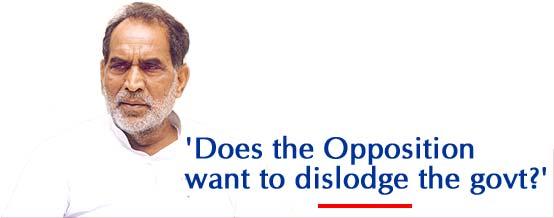Home > News > Interview
The Rediff Interview/Former prime minister Chandrashekhar
July 24, 2003

Former prime minister Chandrashekhar regrets that an opportunity was missed to solve the Ayodhya dispute when his government was in power.
In this exclusive interview with Chief Correspondent Tara Shankar Sahay, he discusses the Ayodhya dispute and other issues confronting the government.
Vice-President Bhairon Singh Shekhawat told a rally in Bihar in April that had your government survived for 10 more days in 1991, the Ayodhya dispute could have had a lasting solution. How was it possible?
Let me explain. Since both parties had stuck to their rigid stand of not conceding anything, I made it clear that a solution could only emerge by mutual give-and-take between them. There were well-meaning individuals from both sides who encouraged my government's moves. After a lot of effort, the contours of an agreement emerged. In hind sight, I must say that valuable time was lost in persuading the two sides that they ought to grab the opportunity. Even as things progressed painfully slowly, my government was gone. That is how the entire affair ended.
T V R Shenoy: How Rajiv Gandhi scuttled Ayodhya deal
But the people have a right to know how the dispute could have been solved.
It was a different time and different personalities were involved, not today's fire-and-brimstone types, ready to tear the country's secular fabric apart. I had agreed that if it (the agreement) didn't come off, it would remain a secret. The (other dramatis personae) came forward with this (condition).
So it is best that it be forgotten.
Does that mean you took a political gamble?
I was the prime minister. Taking any initiative in such a sensitive issue automatically meant it was a political gamble. My intentions were honourable.
And you lost?
If my government had lasted, maybe then it would have been a different story.
What do you feel about the Archaeological Survey of India's excavation in Ayodhya?
I don't know what purpose it would have served. It is baffling. Why did the court give such an order? There was no assurance by either party that they would abide by the decision taken on the basis of whatever came out of the excavation.
What about the Opposition allegation that the government misused the CBI to absolve L K Advani and his colleagues in the Babri Masjid demolition case?
There are two versions. The government's version is that the four chargesheeted were absolved by the high court, but those accusing them contend that the high court verdict was overturned by the Supreme Court decision. The apex court said even without the chargesheet, the case can be pursued. If this is taken literally and also in spirit, then the original FIR is wrong. If it is changed on the basis of the high court decision, then this cannot be justified.
What is your current assessment of the Ayodhya dispute?
As things are moving, I see a very depressing scenario because it will create more bitterness. People will be more stubborn in their opposition to each other. Any reconciliation requires that people should be ready for give and take. The two parties are not only sticking to their old respective positions but putting forth new conditions. I don't see any silver lining.
Is Opposition unity being hampered by the issue of the Congress party claiming Sonia Gandhi would be its prime ministerial candidate?
That question comes later. I really don't know whether the Opposition parties want to dislodge this government and cobble together an alternative government.
Why do you say that?
Isn't it obvious that Opposition unity is yet to fructify? I am not sure if all the Opposition entities want to unite because they are fighting among themselves. Even on crucial issues, they are not speaking in one voice. As to your question of who will be prime minister, that should not have been made a pre-condition for Opposition unity. I don't know whether anywhere a person of foreign origin has occupied the posts of either the prime minister or President. So this objection should not be taken lightly.
When you were prime minister, the Kashmir problem had begun taking root. How do you think it should be tackled?
It need not be repeated that a solution cannot come overnight. But this government has bungled from one mistake to another. It has gone back on its decisions pertaining to J&K.
Simple fire-fighting will not do. Well thought-out decisions, once taken, will have to be implemented.
Do you favour Track II diplomacy to thaw relations between India and Pakistan?
Every vista should be tried if the peoples of the two countries are keen on improving relations with one another.
But the militants are getting more provocative and aggressive.
It is the government's job to ensure that they are effectively countered. Mr Advani keeps saying the J&K situation has improved. Control of the situation would have meant that there are no security slip-ups which occur every now and then in the state.
Did you say one couldn't establish oneself if one did not have moral values in politics?
No, I did not say that. What I said was the pre-requisite in politics is that the people should accept the word given by the politician. If the impression goes that people in politics say something and do just the opposite, then parliamentary democracy cannot be sustained. It may be true in fascist organisations that change their statements every day but still survive despite that by churning out emotional slogans. But they should be avoided in a democratic set-up.